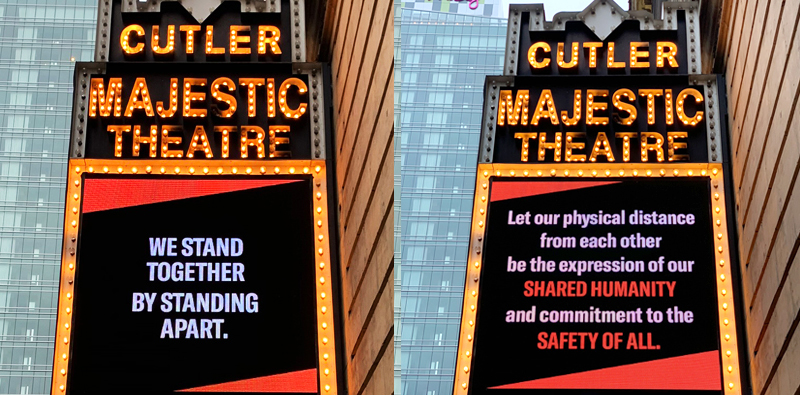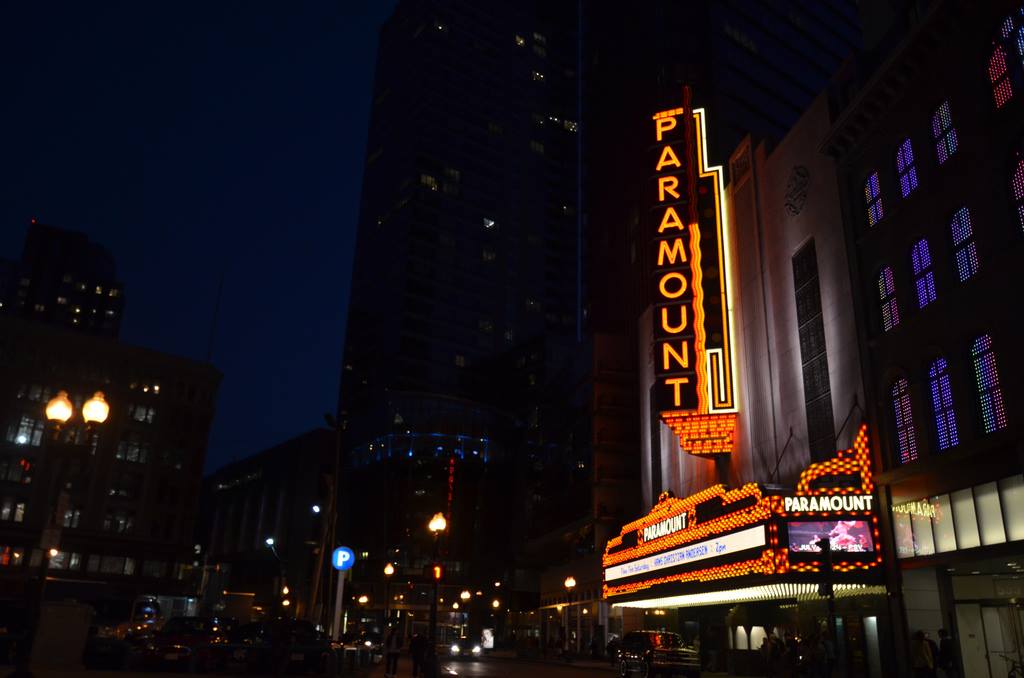Share This:
March 16, 2021 | Notes From Leadership,
There Is No Going Back to the “Good Ol’ Days” by Executive Director David C. Howse
This piece was originally published in the Boston Globe Magazine; it appeared online on Wednesday, March 10, 2021 and in the print edition on Sunday, March 14, 2021.
The morning of March 11, 2020 — a year and a lifetime ago — started as a typical day. I embarked on my quotidian routine of breakfast with the family, the commute to the office, phone calls with patrons, and meetings with artists. Plata Quemada, a visually stunning theater adaptation of a book depicting an infamous 1965 bank heist in Buenos Aires, was opening at the Paramount Center at ArtsEmerson that evening. All seemed right with the world. Or so we thought.
The pandemic forced the show to close the following night. As in art, so in life; a part of our lives had closed, too. I felt robbed of so much that I had taken for granted: access to our loved ones, our safety, the loss of human connection — and the loss of live artistic experiences. All was not right with the world.

On March 13 we were all sent home from the theater, shuttering doors and shutting down the lights for what we thought would be a brief hiatus. We left our desks intact, documents open on our computers, plants on the windowsills, and leftover lunches in the refrigerators. Looking back, none of us could have imagined we would be away for one week, let alone one year. And yet, we find ourselves cautiously navigating an unfamiliar world of physical distancing and social dormancy, in an extended period of social recession — a fraying of communal bonds that worsens the longer we go without human interaction.RELATED: $588 million lost. 30,000 jobs impacted. A new report shows the damage done to the arts industry
I miss the daily activities that our public gatherings, like our theaters, provided: the handshakes before meetings, the hugs in the lobby, and the smiles from my fellow audience members. Humans exist to be in community with each other, not distanced, and many of us feel as if we are at a breaking point. But instead of breaking, I am holding on as we turn the corner on this pandemic. More people are following the safety protocols, the vaccine is moving — though somewhat haphazardly — through our communities, and warmer days are coming. Many of us are eagerly waiting for the doors of the world to open once again; many of us are waiting for the doors of the theaters to open again. And they will.
As we approach the summer months, I firmly believe there will be a social explosion in this city and cities across the country. Humans, long-shuttered from the people and experiences that bring them joy and community, will clamor without pause to find opportunities for meaningful connection, and they will look first to those cultural organizations and spaces that have helped them to make sense of the world and their role in it.
Dr. Anthony Fauci, the nation’s top infectious disease expert, suggested in January at a national forum for the performing arts community that our performance venues should reopen again this fall. His voice has been the guiding force during these uncertain times, and though many of us have counted on his predictions, each one of us has a role to play toward a safe return to public gathering spaces. Ever the optimist, I am holding onto hope and cautiously making plans to a return to the familiar. Familiar — not the same.
I believe that we will be looking to new experiences, new relationships, all in search of expanding our empathy and understanding. The pandemic and the pause it created have provided an opportunity for deep reflection. Out of that reflection comes a hunger: hunger for understanding or sense-making, yearning for togetherness, and need for public healing.
The theater, and art in general, provides that opportunity to bring us together and to heal. The stories on stage promote social discourse that bridges our differences, telling us who we are as a city and helping us see who we can become. Theater fosters empathy and brings a higher understanding of our common humanity. It reminds us that we are not alone — we are in this together.
The digital platform has been a much-needed “venue” for maintaining a connection to the art and the artists. It also opened the doors to those who may not have stepped into a theater before. Cultural and social as well as physical and financial barriers prevent many from engaging in our work in the theaters. The uptick in viewership has increased over the months, bringing us new national and international audiences. We commit to maintaining the conversation with our digital community members, knowing that not everyone will be eager to return to the live experience at the same pace.
With all its advantages and access to art, technology-provided theater — Zoom theater — pales compared with live, in-person performances. When we are in proximity to each other in the theater, we feel the palpable energy between the audience and the artist, we share collective breaths that we take at pivotal points in the show, we pause in the moment of silence before the roar of a standing ovation. Believe it or not, I even miss the unsuccessful attempt of fellow audience members to surreptitiously open crinkling candy wrappers. While we continue to learn about ways to broaden access, I hope that we will have the privilege of warmly welcoming our digital audience into our venues.

And the much-anticipated news is out: Performance venues in Boston will be allowed to open on March 22. How I wish it were as easy as flipping a switch and opening the theaters on that day, but we know that there are many important steps to take before reopening, like contracting artists and aligning our practices with new safety protocols. This will take time. But when our physical doors open again — and we are cautiously optimistic that it will be as early as the fall — I hope that we’ll abandon nostalgia for the good old days, knowing that the good old days were not good for everybody. As we prepare to return, let’s decide to do something different: expand our capacity to love by expanding our curiosity about others and our imagination to see that everyone has a place in this city.
Our theater is dark, but when the curtain opens again, we’ll be there, likely donning our favorite masks. We will return to the communal experience of live performance, seeking meaning-making, connection, and healing.

As we continue to navigate through these unfortunate circumstances, we hope you will consider making a gift to ArtsEmerson by clicking here. Your generosity will help us deliver inspired programming to the comfort of your own homes while sustaining us for the future when we can commune in our theatres once again.




Leave a Reply